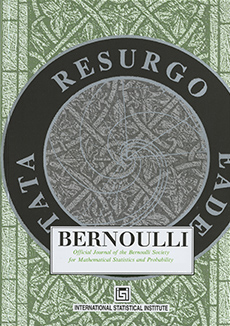Abstract
Let ${\mathbf{X}}_{p}=({\mathbf{s}}_{1},\ldots,{\mathbf{s}}_{n})=(X_{ij})_{p\times n}$ where $X_{ij}$’s are independent and identically distributed (i.i.d.) random variables with $EX_{11}=0$, $EX_{11}^{2}=1$ and $EX_{11}^{4}<\infty$. It is showed that the largest eigenvalue of the random matrix ${\mathbf{A}}_{p}=\frac{1}{2\sqrt{np}}({\mathbf{X}}_{p}{\mathbf{X}}_{p}^{\prime}-n{\mathbf{I}}_{p})$ tends to $1$ almost surely as $p\rightarrow\infty$, $n\rightarrow\infty$ with $p/n\rightarrow0$.
Citation
B.B. Chen. G.M. Pan. "Convergence of the largest eigenvalue of normalized sample covariance matrices when $p$ and $n$ both tend to infinity with their ratio converging to zero." Bernoulli 18 (4) 1405 - 1420, November 2012. https://doi.org/10.3150/11-BEJ381
Information





